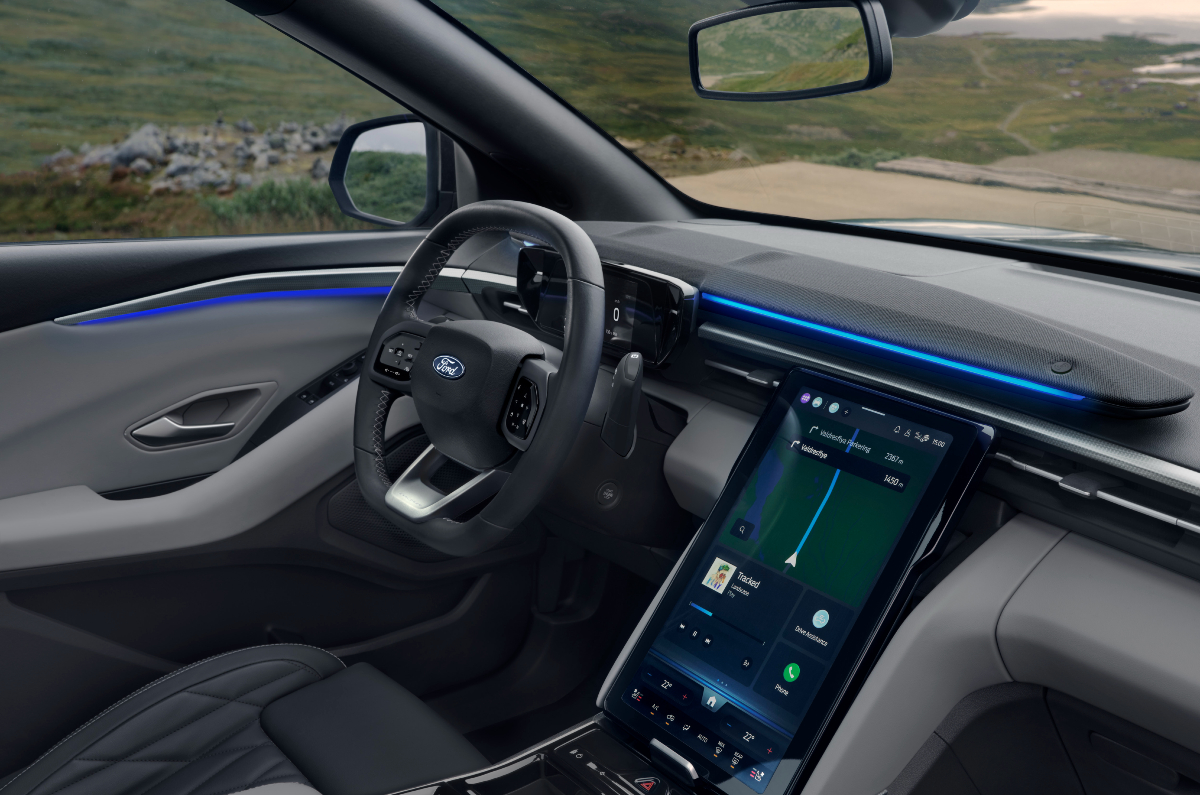
The Explorer EV SUV will be built in Germany at Ford’s Cologne plant; replaces the combustion-powered Explorer SUV in Europe.
Ford has revealed the Explorer EV SUV. Not to be mistaken with the Ford Explorer SUV sold in North America and some European markets, the all-electric Ford Explorer shown recently is a European focussed, European-designed and European-built born-EV SUV which has nothing in common with the North American Explorer, save for the marketing name. The new Explorer EV will replace the ICE-powered model that is currently on sale in Europe.
- Ford Explorer EV uses VW MEB platform
- Will be built in Germany
- Will go on sale in Europe first
Ford Explorer EV production at Germany plant
Likely to start rolling off the production line at Ford’s revamped factory in Cologne, Germany (where it currently builds the Ford Fiesta) from mid-2023, the new SUV measures 4,460mm long. This pitches it roughly between the highly competitive small and midsized SUV markets overseas and means it will compete with everything from the Jeep Avenger and Mini Aceman to the Hyundai Ioniq 5 (also on sale in India), and even the Skoda Enyaq iV (India launch in the works).
In this respect and many others, it is the most important new Ford product for the European market in decades and will be crucial in paving the way for a totally overhauled – and downsized – range of passenger EVs designed around the concept of ‘American-ness’, far removed from the likes of the Fiesta, Focus and Mondeo that have gone before.
Ford Explorer EV: first of two VW MEB-based models
The Explorer is the first Ford EV – of two so far confirmed – to use Volkswagen’s MEB electric vehicle platform as part of a partnership in which the US firm reciprocates by building VW-badged commercial vehicles in Turkey and South Africa. Choosing dimensions that put it halfway between the VW ID 3 and ID 4 was a conscious decision to avoid directly competing with those two cars, but it was not a condition for Ford to use the platform.
Ford Explorer EV exterior design
According to the car’s designers, its bluff front end with the larger new logo, the beltline that wraps around the entire car, the ‘generous’ wheel arches and the floating roof with contrasting black A-pillars are some of its defining features. The designers are also keen to emphasise that while the Explorer represents a departure from the established conventions of Ford design, future models will not follow a ‘Russian doll’ approach in adopting the same cues and proportions.
Boosting interior space compared with same-sized ICE propositions was a priority for the design team, who tout the flat floor and modularity of the MEB platform as allowing the Explorer to offer ‘large car’ qualities in a relatively compact footprint.
There is no storage under the bonnet; the Explorer is equipped with a ‘secret’ load bay under the boot floor and the 17-litre ‘Megaconsole’ cubby between the two front seats is one of the largest fitted to any production car. Boot space is put at 450 litres with the seats up – bigger than in the Mustang Mach-E – and 1,400 litres with them folded. The load floor can also be raised or lowered according to requirements.
Ford Explorer EV interior
On the inside, the focus on ease of use extends to the cockpit area, where the standard-fitment 15-inch portrait touchscreen – running the latest version of Ford’s Sync infotainment platform – is mounted on hinges, so it can be fixed flat upright or reclined up to 30 degrees. The former facilitates a “more active” driving style, according to Ford, as well as freeing up another 1.7-litre storage tray.
Tilting the screen means it can be used in a more relaxed manner, with an elbow resting on the centre console. The screen controls most key functions and has a permanently visible and accessible climate control interface. The Explorer is also equipped with physical and haptic controls that can be used easily on the move, including a vibrating, illuminating touch slider for the volume.
Ford Explorer EV powertrain
In its most potent form, the new Explorer EV will feature a motor on each axle for a combined 340hp and 545Nm – more than any other MEB-based production EV currently on sale and sufficient for a sub-6.0sec 0-100kph time. Ford has not yet said if this range-topper will bear the hallowed ST (or even RS) badge, but it has confirmed that a dedicated Sport mode will be one of five available on all-wheel-drive cars.
There are also two rear-driven options, one with 170hp and the other with 286hp. Battery options have not yet been detailed, but Ford is targeting a maximum range of 422km from the longest-legged ‘Max’ variant. The Explorer is expected to offer an entry-level 52kWh battery and the 77kWh unit that nets a claimed 328km per charge in the slightly larger Audi Q4 e-tron – both of which can charge at speeds of 170kW.
Ford and India
Ford shut shop in India in 2022 due to slow sales. While market launches of fully imported EVs like the Mustang Mach E were considered, there is no update on when it will make it to India.
Also see:
Ford India to retain over 90 percent of service network
Tata Motors acquires Ford’s Sanand plant for Rs 725 crore
